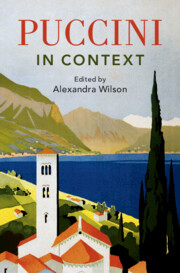Book contents
- Puccini in Context
- Composers in Context
- Puccini in Context
- Copyright page
- Contents
- Figures
- Table
- Notes on Contributors
- Preface
- Part I Formative Influences
- Part II Puccini’s Places
- Part III Influences and Interests
- Part IV Bringing Puccini to the Stage
- Part V Image and Reputation
- Part VI Puccini through a Political Lens
- Chapter 22 Puccini and Religion
- Chapter 23 Puccini and Politics
- Chapter 24 Gender Politics in Puccini’s Operas
- Chapter 25 The Racial Politics ofMadama ButterflyandTurandot
- Part VII Interpreting Puccini
- Part VIII Legacy
- Bibliography
- Index
Chapter 23 - Puccini and Politics
from Part VI - Puccini through a Political Lens
Published online by Cambridge University Press: 31 August 2023
- Puccini in Context
- Composers in Context
- Puccini in Context
- Copyright page
- Contents
- Figures
- Table
- Notes on Contributors
- Preface
- Part I Formative Influences
- Part II Puccini’s Places
- Part III Influences and Interests
- Part IV Bringing Puccini to the Stage
- Part V Image and Reputation
- Part VI Puccini through a Political Lens
- Chapter 22 Puccini and Religion
- Chapter 23 Puccini and Politics
- Chapter 24 Gender Politics in Puccini’s Operas
- Chapter 25 The Racial Politics ofMadama ButterflyandTurandot
- Part VII Interpreting Puccini
- Part VIII Legacy
- Bibliography
- Index
Summary
This chapter considers the relationship between Puccini and politics. It shows that Puccini was an admirer of Mussolini at the beginning of the Fascist period, speculates how his political allegiances might have developed had he lived longer, and asks whether Turandot can be read as a ‘fascist’ opera. It discusses the politicisation of high culture during the composer’s lifetime but shows there is no evidence that the work was intended as a political allegory. Much of the chapter is devoted to a consideration of the issue of politics in Tosca, ranging across themes such as anti-clericalism and whether the figure of Scarpia anticipates a specifically fascist brutality. The author uses Carmine Gallone’s film Avanti a lui tremava tutta Roma as a lens through which to consider these issues. The chapter also considers stagings of the opera that put an explicitly political slant on the work, as well as discussing a variety of political (and purportedly ‘anti-political’) readings of the opera in the Puccini literature.
- Type
- Chapter
- Information
- Puccini in Context , pp. 189 - 196Publisher: Cambridge University PressPrint publication year: 2023

